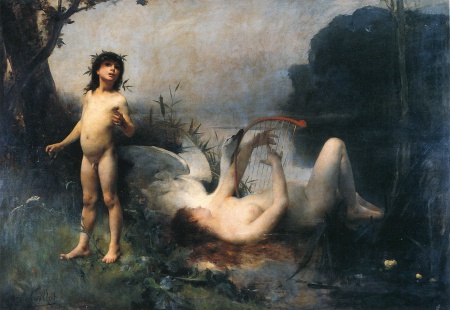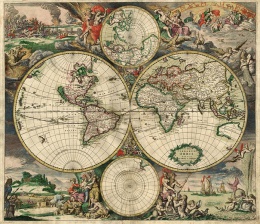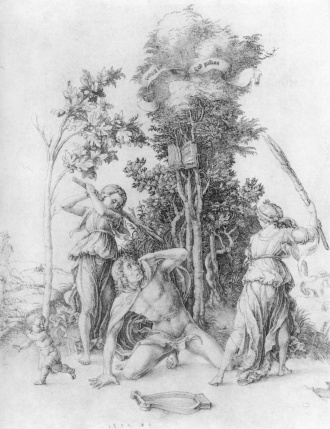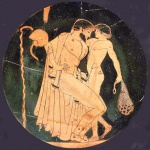Orpheus (mythology): Difference between revisions
No edit summary |
No edit summary |
||
| (18 intermediate revisions by 2 users not shown) | |||
| Line 1: | Line 1: | ||
[[File:CALLOT Georges 1884 L'éducation d'Orphée 1280x881.jpg|thumb||thumb|upright= | [[File:CALLOT Georges 1884 L'éducation d'Orphée 1280x881.jpg|thumb||thumb|upright=1.5| ''The education of Orpheus'' / Georges Callot. – 1884. – Oil on canvas]] | ||
Orpheus (/ˈɔrfiəs, ˈɔrfjuːs/; Greek: Ὀρφεύς) was a legendary musician, poet, and prophet in ancient Greek religion and myth. The major stories about him are centered on his ability to charm all living things and even stones with his music. As an archetype of the inspired singer, Orpheus is one of the most significant figures in the reception of classical mythology in Western culture, portrayed or alluded to in countless forms of art and popular culture including poetry, film, opera, and painting. | '''Orpheus''' (/ˈɔrfiəs, ˈɔrfjuːs/; Greek: Ὀρφεύς) was a legendary Thracian musician, poet, and prophet in [[Ancient Greece|ancient Greek]] religion and myth. As a boy, he was given a golden lyre by [[Apollo (mythology)|Apollo]] and was taught by the god to play it. The major stories about him are centered on his ability to charm all living things and even stones with his music. As an archetype of the inspired singer, Orpheus is one of the most significant figures in the reception of classical mythology in Western culture, portrayed or alluded to in countless forms of art and popular culture including poetry, film, opera, and painting. | ||
{{History}} | |||
| Line 12: | Line 12: | ||
''"... Orpheus had abstained from the love of women, either because things ended badly for him, or because he had sworn to do so. Yet, many felt a desire to be joined with the poet, and many grieved at rejection. Indeed, he was the first of the Thracian people to transfer his love to young boys, and enjoy their brief springtime, and early flowering, this side of manhood."'' | ''"... Orpheus had abstained from the love of women, either because things ended badly for him, or because he had sworn to do so. Yet, many felt a desire to be joined with the poet, and many grieved at rejection. Indeed, he was the first of the Thracian people to transfer his love to young boys, and enjoy their brief springtime, and early flowering, this side of manhood."'' | ||
Ovid also wrote a story about Orpheus singing and praising about "boys loved by the gods, and girls stricken with forbidden fires, deserving punishment for their lust.". Part of the song was about [[Zeus (mythology)|Zeus's]] burning love [[Ganymede (mythology)|Ganymede]] and how he had carried him away as an eagle. The other part was about Phoebus ([[Apollo (mythology)| | Ovid also wrote a story about Orpheus singing and praising about "boys loved by the gods, and girls stricken with forbidden fires, deserving punishment for their lust.". Part of the song was about [[Zeus (mythology)|Zeus's]] burning love [[Ganymede (mythology)|Ganymede]] and how he had carried him away as an eagle. The other part was about Phoebus ([[Apollo (mythology)|Apollo]]) grieving over dying [[Hyacinth (mythology)|Hyacinth]] and immortalizing him by a flower representing the "flower of youth"<ref>http://poetryintranslation.com/PITBR/Latin/Metamorph10.htm</ref> | ||
==Death of Orpheus== | ==Death of Orpheus== | ||
[[File:DÜRER Albrecht (nach Andrea MANTEGNA) 1494 Der Tod des Orpheus - Orpheus der erst Puseran 2310x3000.jpg|thumb|Death of Orpheus | [[File:DÜRER Albrecht (nach Andrea MANTEGNA) 1494 Der Tod des Orpheus - Orpheus der erst Puseran 2310x3000.jpg|thumb|left|upright=1.1|''Death of Orpheus'' / Albrecht Dürer ; after Andrea Mantegna. – 1494. – Pen drawing]] | ||
Feeling spurned by Orpheus for taking only male lovers, the Ciconian women, followers of Dionysus,<ref>http://books.google.com/books?id=tX9iAAAAMAAJ</ref> first threw sticks and stones at him as he played, but his music was so beautiful even the rocks and branches refused to hit him. Enraged, the women tore him to pieces during the frenzy of their Bacchic orgies.<ref>http://poetryintranslation.com/PITBR/Latin/Metamorph11.htm</ref> In Albrecht Dürer's drawing of Orpheus's death, based on an original, now lost, by Andrea Mantegna, a ribbon high in the tree above him is lettered Orfeus der erst puseran ("Orpheus, the first pederast").<ref>http://books.google.com/books?id=RDLmcOyWxgIC&pg=PA24</ref> | Feeling spurned by Orpheus for taking only male lovers, the Ciconian women, followers of [[Dionysus]],<ref>http://books.google.com/books?id=tX9iAAAAMAAJ</ref> first threw sticks and stones at him as he played, but his music was so beautiful even the rocks and branches refused to hit him. Enraged, the women tore him to pieces during the frenzy of their Bacchic orgies.<ref>http://poetryintranslation.com/PITBR/Latin/Metamorph11.htm</ref> In Albrecht Dürer's drawing of Orpheus's death, based on an original, now lost, by Andrea Mantegna, a ribbon high in the tree above him is lettered Orfeus der erst puseran ("Orpheus, the first pederast").<ref>http://books.google.com/books?id=RDLmcOyWxgIC&pg=PA24</ref> | ||
{{clr}} | {{clr}} | ||
==See also== | ==See also== | ||
* [[Ancient Greece]] | |||
* [[Apollo (mythology)]] | |||
* [[Ganymede (mythology)]] | |||
* [[Hyacinth (mythology)]] | * [[Hyacinth (mythology)]] | ||
==References== | ==References== | ||
| Line 29: | Line 32: | ||
==External links== | ==External links== | ||
*[http://en.wikipedia.org/wiki/Orpheus Orpheus (wikipedia)] | *[http://en.wikipedia.org/wiki/Orpheus Orpheus (wikipedia)] | ||
[[Category: | {{Navbox Pederasty|collapsed}} | ||
[[Category:Greek mythology]] | |||
[[Category:Roman mythology]] | |||
Latest revision as of 23:03, 27 June 2022

Orpheus (/ˈɔrfiəs, ˈɔrfjuːs/; Greek: Ὀρφεύς) was a legendary Thracian musician, poet, and prophet in ancient Greek religion and myth. As a boy, he was given a golden lyre by Apollo and was taught by the god to play it. The major stories about him are centered on his ability to charm all living things and even stones with his music. As an archetype of the inspired singer, Orpheus is one of the most significant figures in the reception of classical mythology in Western culture, portrayed or alluded to in countless forms of art and popular culture including poetry, film, opera, and painting.
| Part of the boylove history series |
 |
| Portal:History |
Orpheus and Pederasty
Most of stories about Orpheus comes from roman poet Ovid. An important part of the myth of Orpheus centers around his descent to the underworld to rescue his newly wedded bride Eurydice. As he found his wife as a recent ghost, she vanished and died a second time. Orpheus was much in sorrow and it took seven days for Orpheus to come out of Hades. Afterward, he abstained from the love of women and became the first Thracian to transfer his love for boys. From Metamorphoses of Ovid:
"... Orpheus had abstained from the love of women, either because things ended badly for him, or because he had sworn to do so. Yet, many felt a desire to be joined with the poet, and many grieved at rejection. Indeed, he was the first of the Thracian people to transfer his love to young boys, and enjoy their brief springtime, and early flowering, this side of manhood."
Ovid also wrote a story about Orpheus singing and praising about "boys loved by the gods, and girls stricken with forbidden fires, deserving punishment for their lust.". Part of the song was about Zeus's burning love Ganymede and how he had carried him away as an eagle. The other part was about Phoebus (Apollo) grieving over dying Hyacinth and immortalizing him by a flower representing the "flower of youth"[1]
Death of Orpheus

Feeling spurned by Orpheus for taking only male lovers, the Ciconian women, followers of Dionysus,[2] first threw sticks and stones at him as he played, but his music was so beautiful even the rocks and branches refused to hit him. Enraged, the women tore him to pieces during the frenzy of their Bacchic orgies.[3] In Albrecht Dürer's drawing of Orpheus's death, based on an original, now lost, by Andrea Mantegna, a ribbon high in the tree above him is lettered Orfeus der erst puseran ("Orpheus, the first pederast").[4]
